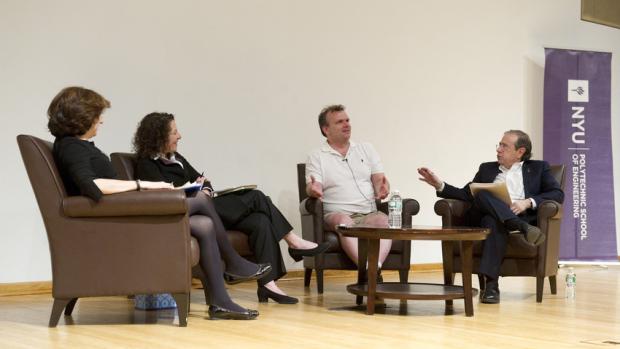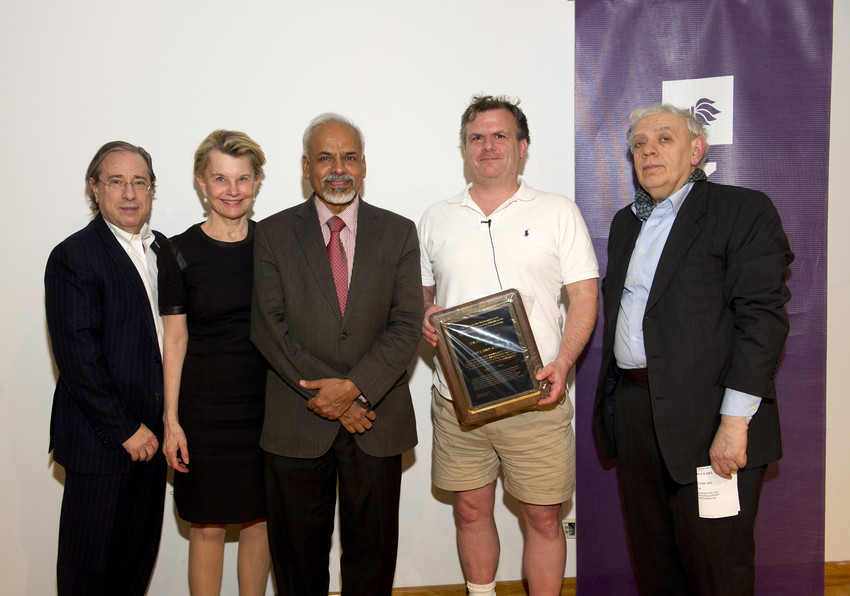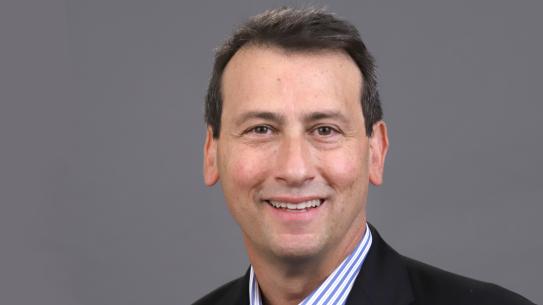Lynford Lecturer Eric Schadt Uses Big Data to Construct Predictive Models of Disease That Could Change the Face of Medicine

Trustee Jeffrey Lynford has a knack for pinpointing scientists and thinkers at the cutting edge of discovery. Since it was launched in 1998, the annual lecture series that bears his name has featured three Nobel laureates, two Turing Award winners, and a Fields medalist. On March 12, he added to that noteworthy roster when Eric Schadt, a computational biologist who heads the Icahn Institute for Genomics and Multiscale Biology at Mt. Sinai, addressed a large audience at the NYU Polytechnic School of Engineering.
Schadt is known for taking a data-enabled, network-oriented view of human health, in stark contrast to the reductionist, single-gene approaches that currently dominate medical inquiry. He doesn’t mind, he told his listeners, being considered an iconoclast. “Orthodox thinking that stifles innovation isn’t unique to medicine,” he asserted, explaining that technology can be disruptive no matter what the field. “Think of Harry Warner, the studio head who wondered why anyone would ever want to hear an actor speak, or Thomas Watson of IBM, who thought that there would never be a world market for more than five computers.”
Schadt is engaged in proving that data and computing can be used to make breakthroughs in the prevention and treatment of cancer, diabetes and other such diseases, which involve not merely single genes but a complex network of factors, Including age, gender, vital signs, toxic exposure, and family history. His current research, he explained, seeks to find gene mutations that prevent diseases an individual might reasonably expect to develop. If someone has four siblings who develop early-onset Alzheimer’s, for example, but they avoid that fate, chances are good he or she is carrying a mutated gene that prevents it; if such a mutation is discovered, scientists might use that knowledge to develop preventative treatment for everyone at risk of the disease.
Thanks to the fact that sequencing DNA is relatively inexpensive and quick, Schadt and his colleagues have been able to undertake a massive task. Working on what they’ve dubbed the Resilience Project, they have analyzed some 600,000 already-sequenced human genomes, and they hope to find a million more volunteers to donate DNA. (They expect only about 1 in 20,000 subjects to be resilient—in other words to have the genetic mutation associated with a disease but not the disease itself.)
 The sheer amount of data being generated in the current digital medical revolution—along with its sensitivity—necessarily brings up issues of informed consent and privacy, and Lynford invited Professor Beth Noveck of NYU’s Governance Lab to take part in a panel discussion after the lecture to address those concerns. Also on hand was Dr. Ellen Scherl, a world-renowned researcher of chronic disease, invited for her insights on conventional medical research versus big data-driven investigations. The audience—which included everyone from Gregory and David Chudnovsky, the venerable professors who comprise the School of Engineering’s Institute for Mathematics and Advanced Supercomputing, and Tondra Lynford of the Lynford Family Charitable Trust, to Mark Sfreddo, a student at John Jay High School who is embarking on an ambitious three-year research project on autism spectrum disorders as part of his curriculum—was obviously appreciative of the lively discussion that ensued. Everyone—from the most seasoned researchers to the youngest—agreed that they were leaving the 16th Annual Lynford Lecture will plenty to mull over.
The sheer amount of data being generated in the current digital medical revolution—along with its sensitivity—necessarily brings up issues of informed consent and privacy, and Lynford invited Professor Beth Noveck of NYU’s Governance Lab to take part in a panel discussion after the lecture to address those concerns. Also on hand was Dr. Ellen Scherl, a world-renowned researcher of chronic disease, invited for her insights on conventional medical research versus big data-driven investigations. The audience—which included everyone from Gregory and David Chudnovsky, the venerable professors who comprise the School of Engineering’s Institute for Mathematics and Advanced Supercomputing, and Tondra Lynford of the Lynford Family Charitable Trust, to Mark Sfreddo, a student at John Jay High School who is embarking on an ambitious three-year research project on autism spectrum disorders as part of his curriculum—was obviously appreciative of the lively discussion that ensued. Everyone—from the most seasoned researchers to the youngest—agreed that they were leaving the 16th Annual Lynford Lecture will plenty to mull over.




